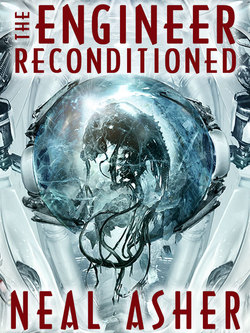Читать книгу The Engineer ReConditioned - Neal Asher - Страница 3
ОглавлениеINTRODUCTION, by Neal Asher
I am a classic overnight success i.e. that particular night was over twenty years long. It has been a struggle up the ladder, missing not a single rung, quite often stepping back down some, and every now and again having someone stand on my fingers. I spent many years in the wilderness of non-publication wondering if I’d made the right choice of vocation while I wrote the inevitable fantasy trilogy (still unpublished), then I was published in the small presses over many years, and finally…Macmillan. Too often, we read of someone getting the x-thousands advance on a first book and hearing this lose sight of the fact that it doesn’t normally happen that way. There is, unfortunately, a lot of truth in the image of the writer struggling away in his garret then drinking himself to death. Writing is hard, getting work published is hard, and if you want easy money, your best option is to become an estate agent. It took me five or more years to get my first short story accepted and then that magazine folded before publication. After that slight boost (and it was a boost; someone had actually wanted my work) I managed to get more and more stories published, the occasional novella serialised, and a one-off novella published for a single cash payment. For my short stories my reward was a copy of the magazine and some complimentary letters (mostly). After another five years I was getting the occasional cheque—about enough to pay for a toner cartridge a year—then in the following five years finally gained some notoriety through the publisher, Tanjen. But then they, like so many small press publishers, went to the wall.
Unfortunately, small publishers are really up against it trying to succeed in a world dominated by huge publishing consortiums. Anthony Barker did not have sufficient spare cash to wine and dine the book buyers for the main book chains, could not afford large print runs, or divide distribution costs over many titles. Was it a shame for me, though?
Tanjen had already published my novella The Parasite (illustrated by Ralph Horsley), The Engineer was getting good reviews and apparently a thousand copies had been taken in America, and Anthony was talking about publishing a book of mine called Gridlinked, Ah twenty-twenty hindsight. If Tanjen had not gone to the wall when it did, I would not have sent synopsis and sample chapters of Gridlinked to Peter Lavery of Pan Macmillan at precisely the right time. But then again, had Tanjen not published my other books, I would not have had a full-colour SFX review of The Engineer to send along as well. Ifs buts and maybes. Maybe, in infinite parallel universes, I get run over by a bus while taking my third typescript for Tanjen to the Post Office.
Anyway, I feel The Engineer is a collection I have a lot to be thankful for, and one I’ll always love because in size and appearance it seemed my first real book. It was a shame that people could no longer obtain it (though I heard of a guy in America gladly paying about $20 for a second-hand version). So here it is, with extra waffle from me and additional stories to tempt the completists.
Novellas being notoriously difficult to publish, unless in collections like this, The Engineer has been seen nowhere but in the Tanjen edition. In this story you can find some of the roots of the runcible universe portrayed in the Macmillan books. Here you get to see one of the Jain, who made a technology that destroyed them, and other races after them…maybe. It was utterly natural for humans, on the archaeological evidence, to attribute the technology to the species that used it, rather than see a species used by technology. They got it wrong, didn’t they?
I know some readers would like to fit this story into a chronology. Did these events occur before or after Skellor starting throwing his weight around? Someone said to me that because the Cable Hogue is referred to in the Gridlinked sequence, the events here must have been just after, because had they been before, more mention would have been made of them. Well, not really. Immortal AI starships can exist for a very long time, and covering significant screw-ups is not an unusual governmental technique. Will I answer the question? Some day, in another book or short story, but not here. You see, my future history has not sprung full-grown from my forehead, but is still fermenting behind it.
